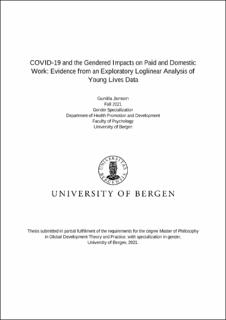COVID-19 and the Gendered Impacts on Paid and Domestic Work: Evidence from an Exploratory Loglinear Analysis of Young Lives Data.
Master thesis
Permanent lenke
https://hdl.handle.net/11250/2836572Utgivelsesdato
2021-12-14Metadata
Vis full innførselSamlinger
- Master theses [165]
Sammendrag
The outbreak of the COVID-19 pandemic in early 2020 resulted in a global economic crisis, with severe consequences for the lives and livelihoods of people worldwide. While hundreds of millions of people were unable to work as usual due to lockdowns and restrictions, simultaneously, the burden of care work increased drastically as a result of school closures, work-from-home orders, and overwhelmed healthcare systems. The purpose of this study was to explore the gendered impacts of the crisis, by examining how young men and women’s time spent on paid and domestic work in four global south countries was affected during the lockdown of the first wave of the pandemic. Drawing on data from the Young Lives project, this study used chi-square tests and loglinear analysis to explore the associations between sex, economic sector, paid work during lockdown, and domestic work during lockdown. The results revealed that all the bivariate association tests reached statistical significance, and further revealed two significant three-way associations. Women had slightly higher odds of reducing work hours than men, which can, at least partly, be attributed to their overrepresentation in certain economic sectors. Moreover, women had higher odds than men of increasing the time spent on domestic work during lockdown, and the association between domestic work and paid work was found to be stronger for women than for men. These results imply that the time spent on paid work by women was more sensitive to increases in domestic work, than it was for men. In addition, the results indicate that women had a higher vulnerability to shouldering a double work burden during lockdown. The results presented in this study carry important implications for COVID-19 recovery policies and future research on the gendered impacts of economic crises.
